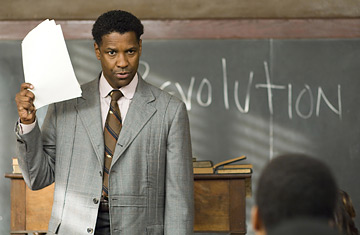
Denzel Washington in The Great Debaters
Rural basketball coaches, inner-city math and music teachers — they are, as we all know, everywhere in the movies, inspiring their unlikely charges to equally unlikely triumphs. Most of these films insist they are based on "true" stories, though none that I know of confess to those melodramatic heightenings of the facts that, sooner or later, place lumps in our throats — which, according to taste, we either wallow in or try to swallow back.
The Great Debaters is this year's major entry to this rather dubious genre. The facts on which the movie is based are these: Beginning in 1935, under the leadership of a professor, poet and political activist named Melvin Tolson (played by Denzel Washington, who also directed), Wiley College, a small black institution in Marshall, Tex., became a power in collegiate debating circles, going undefeated, according to the movie, for a decade. This was no small achievement, considering the school's location deep in redneck country, the impoverishment of the institution in the darkest days of the depression and the endemic racism not just of backwater Texas towns, but of the nation at large.
As the movie would have it, Tolson, in addition to being an inspirational teacher of the tough-love subset (there's no other kind in films) was also a radical, who attempted to organize a racially mixed union of tenant farmers, placing him (and his debaters) in considerable peril from near-riotous mobs. At one point, indeed, they encounter a lynch mob and barely escape with their lives. I don't know if that is a pure or an impure fiction, but it does not strike me as an entirely implausible sequence. I don't know if the composition of Tolson's team, as portrayed here, is entirely accurate either, since it carefully includes a brave and pretty woman (Jurnee Smollett) and a troubled, studly male (Nate Parker) for her to fall in love with. But it is true that the juvenile on the team (Denzel Whitaker) really was, as the film states, James T. Farmer, who grew up to be the founder of CORE (the Congress of Racial Equality) and a towering figure in the civil rights movement of the 1960s.
Probably the biggest whopper is the film's climax, which has gritty little Wiley taking on august Harvard in a nationally broadcasted debate. In reality, the biggest name Wiley argued against was USC, which isn't bad, but doesn't quite reverberate with the same kind of class and caste issues that a contest with The Crimson does. In reality, I'm also inclined to doubt that the Wiley Wildcats always got to argue in the affirmative for Civil Disobedience and against Segregated Education as they do here. If memory serves, debaters in the past often had to snore their way through matters like the Smoot-Hawley Tariff.
But, all that said, I'm inclined to cut The Great Debaters a certain amount of slack. It wants to speak of large issues that remain relevant to us today. It wants to remind us that the seemingly abstract issues these young people are grappling with had authentic, immediate and dangerous implications in their own lives. And that we are not all that far removed from a time in this country when simply being black, whether outspoken or invisible, was a highly risky business. The film may be manipulative in its construction, and cliché-ridden in some of the incidents it recounts, but it has a good, large heart. You could do worse, this holiday season, than to take your children to see this movie and encourage them to reflect on where we have quite recently and shamefully been in this country — when it comes to matters of race — and, perhaps, on how far we have yet to go.
